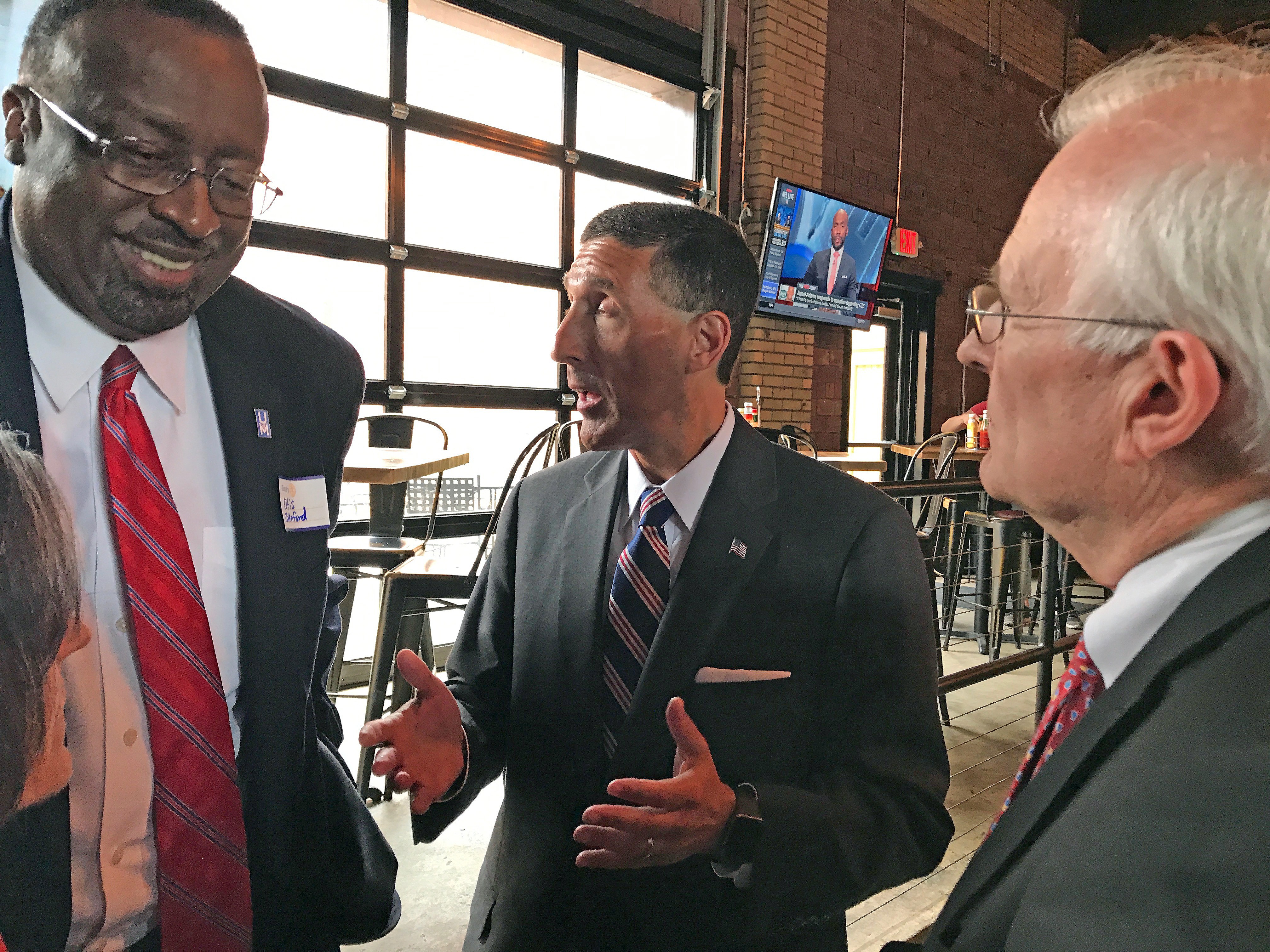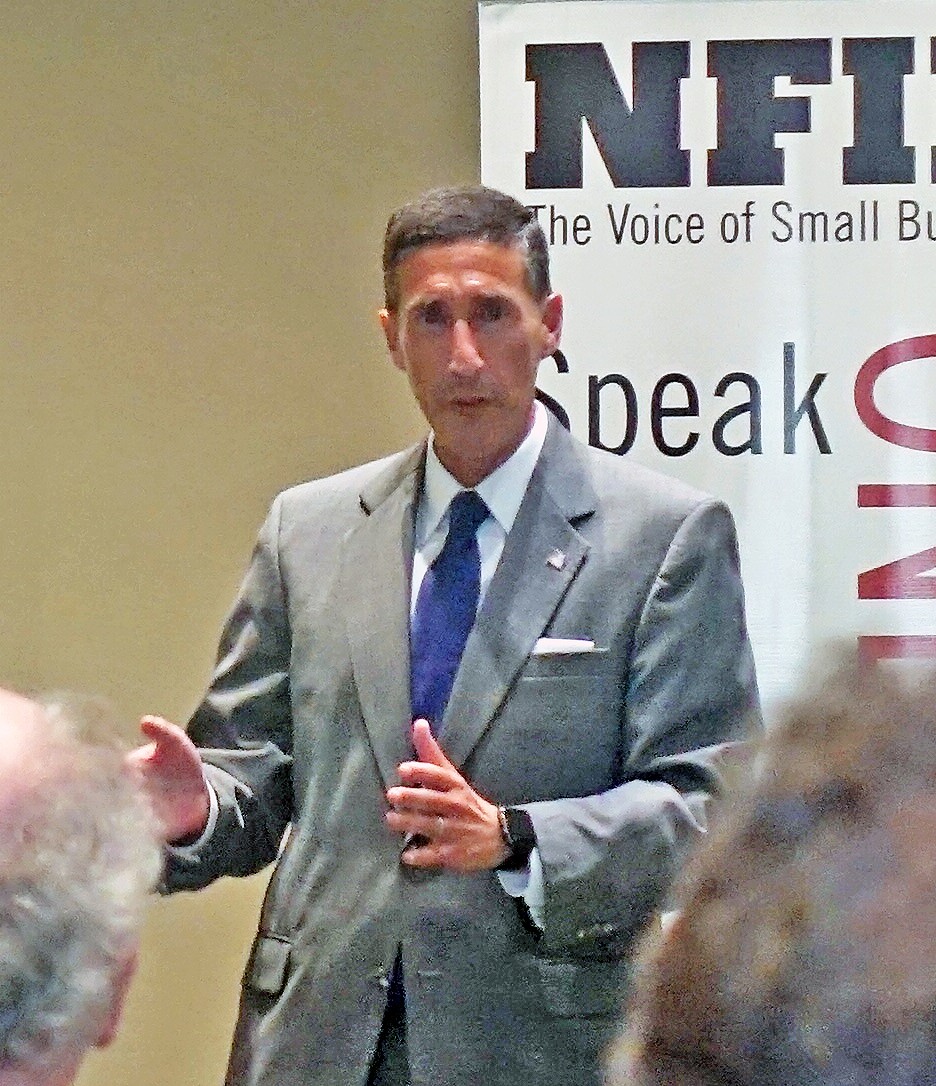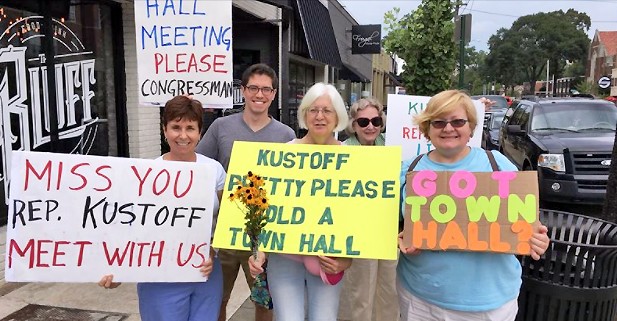Ron Lollar, the veteran GOP state representative from Bartlett, was making a show of gently teasing his friend and fellow Republican David Kustoff, after Kustoff, the congressman from Tennessee’s 8th District, had been the featured speaker at a National Federation of Independent Businesses luncheon at the Regions Bank on Poplar.
Referring to a recent occasion on which they’d been together, administering to constituents in some of the east Shelby County turf they represent in common, Lollar said, “He ate an ice cream cone!” Kustoff, known for his disciplined habits, including an unvarying wake-up time of 3:15 a.m. and an insistence on limiting his dietary intake to one meal a day, in the evening, blinked his eyes momentarily but made a quick recovery.
“But it was at night!” he pointed out with an indulgent smile.
In an easy-going but focused way, the congressman manages always to stay on message. His stop at Regions last Wednesday was one of several, including a luncheon speech he made the day before to the Rotary Club of Memphis, that he had committed himself to in a recess tour of the 15 counties in his sprawling West Tennessee district.
And there were common threads to his remarks at all his appearances: One was an allegation that the Dodd-Frank Act passed in the early years of the Obama administration had harmed both individuals and banks in his district by overloading the lending process with too many governmental strictures. Another related contention was that West Tennessee, alone of the state’s three grand divisions, had a stagnant economy — one that, more than most, required market-friendly remedies, including tax relief and an easing up on regulations.
And, like most Republicans in Congress, Kustoff warns that the Affordable Care Act (aka Obamacare) is in terminal throes — “crashing down,”,as he put it to the Rotarians, with “companies pulling out, insurers leaving the system, and exchanges … with no competition.” Choices were disappearing, and premiums rising, with only a single insurer being available to the system within Shelby County.
Beyond the talking points and generalities he shares with so many other congressional Republicans, Kustoff, a member of the House Committee on Financial Services, can deal with specifics as well, as when, at the NFIB luncheon, he responded in detail to a highly nuanced question about the operations of the Federal Reserve System, throwing in some informed conjecture about the Fed’s likely management in years to come.
Overall, Kustoff gives the impression of having done his homework. But — as with any other able politician, perhaps — there are matters on which his responses might be characterized as somewhere between indirect and evasive.
He demonstrated this during a Q & A session at Rotary when he got three consecutive questions regarding what so many observers, across the political spectrum, regard as disarray or worse in the White House.
During the 2016 campaign year, Kustoff had been unusually steadfast in his support of Donald Trump’s presidential campaign, even when other Republicans displayed hesitation or outright aversion. The congressman was asked: Had President Trump done anything to disappoint him since?
 JB
JB
Kustoff at Rotary with Otis Sanford and David Cocke. (Susan Thorp can also be glimpsed at left.)
Kustoff answered, essentially, that he had been dismayed by Anthony Scaramucci’s famously profane interview with The New Yorker but was gratified that the administration had done the right thing in quickly parting the ways with the now-you-see-him-now-you-don’t communications director. And the Congressman went on to praise Trump’s “terrific nominations” to federal positions in Tennessee.
The next question concerned a new book by Arizona Republican Senator Jeff Flake, Conscience of a Conservative, which is outspokenly critical of Trump and calls on other Republicans to acknowledge the fact. Kustoff’s response was that, in his travels in the 8th District, he encountered no such disillusionment with the President, and, in particular — using a phrasing that would later generate some controversy — that “real people” were not concerned about charges that the Trump campaign had colluded with Russia.
Yet a third question on the putative misdeeds and misprisions of the president yielded a knowing look from Kustoff, who spoke of a “media bias” against Trump before, during, and after his election. “They want to cook his goose. I get that,” said the congressman, who expressed a desire to let various investigating committees — as well as the president and the Congress — “do their job.”
“How’d I do?” Kustoff would ask someone the next day at NFIB. And the truthful answer would be that, like it or not, he had a done a decent job of fencing the questions.
At the NFIB affair, the congressman allowed himself a bit more latitude to speak of bipartisan concerns, particularly in the sphere of foreign policy, but he had a dog-whistle ready when one was called for. One questioner from the predominantly conservative audience at Regions extolled Trump as
 JB
JB
Kutoff answering questions at NFIB meeting
a champion of “capitalism” and asked pointedly, “What is it that the opposition is for?”
Kustoff’s answer was to say, “I read today that one of my colleagues wants single-payer health insurance.” He paused to let such unspoken implications as were implicit in that sink in, threw in the name of Bernie Sanders, and then went on to lament that the ranks of “Blue Dogs,” centrist Democrats, had been seriously depleted.
The innuendo aside, and by the standards of partisan politics, it was relatively smooth and fair-minded. There is a reason why Kustoff is a success at his chosen field.
And when he says that, by and large, the folks in the 8th District — the aforementioned “real people” — simply aren’t interested in the perspectives, crucial as they may be, that animate CNN and MSNBC or the big national newspapers, he may well be right.
For the most part.
But the fact is, there are citizens, even in the 8th, who are genuinely troubled, not just by the fits and starts and confusions that they see in the administration in power, nor by the still unexplained Russia circumstance, but also by policies that seem to them both short-sighted and wrong. Even purposely cruel.
How can this not be the case when GOP Senators like Flake and his Arizona colleague John McCain and Ben Sasse of Nebraska have voiced similar misgivings?
In his expressed forebodings about “Obamacare,” the Congressman spoke to uncertainties that may cause even more insurers to drop away from participation in the system, causing premiums to rise even higher. And he viewed with alarm the tenuous circumstances that rural hospitals in Tennessee find themselves in, citing in particular the case of Brownsville, which lost its local hospital as far back as 2014.
Kustoff is undoubtedly correct that matters like these are are more concerning for his constituents than whether or not Donald Trump Jr. plotted with Russian operatives to do in Hillary Clinton.
But these anxieties are nowhere more pronounced than they are in the ranks of self-described “resistance” groups like the recently founded Indivisible — whose members, like a large proportion of the nation’s punditry, see the uncertainty of insurers to have arisen directly from President Trump’s threats to withhold the funding called for by the ACA in order to see that system, in Trump’s words, “implode.”
And who point to the decision, concurred in by Kustoff, by Republicans in the General Assembly to reject Governor Bill Haslam’s “Insure Tennessee” proposal and the billions of dollars in federal Medicaid money that could have salvaged the Brownsville hospital and other endangered medical facilities in the state.
Several times recently a group of Indivisible members have attempted to coax Kustoff into holding an open, no-holds-barred town meeting on health care and other issues. So far the Congressman has declined, although he has met with individual members of such groups in at least one highly structured scenario in which questions were confined to a limited, pre-arranged formula.
They were at it again this past Tuesday, dogging the Congressman and trying to pin him down to a free-wheeling discussion in the future, picketing him after he had appeared at a Kiwanis Club breakfast at the Pickering Center in Germantown. A member of the protesting group later networked an email saying: ”Kustoff left building intentionally keeping his back to us, got in car and drove past us but he kept his head down the entire time. Too chicken to look at us so he knew we were there.”
This may or may not be a fair-minded description, and, to be sure, the protesters this time around were just a handful, but they were there — and very likely will be there again, to reckon with at some point.

Indivisible group at Pickering protest